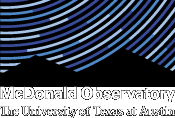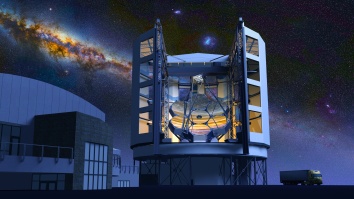World's Most Advanced Mirror for Giant Telescope Completed
23 October 2012
The first mirror for the Giant Magellan Telescope (GMT), a major next-generation telescope in which The University of Texas at Austin is a founding partner, is now completed.
Becoming operational in the next decade under dark southern-hemisphere skies, GMT will lead a new generation of giant telescopes that will explore planets around other stars and the formation of stars, galaxies and black holes in the early universe.
"Our partnership in the GMT will help UT retain its status as one of the top astronomy programs in the United States," said McDonald Observatory director David L. Lambert. "It will give our faculty, researchers, and students access to the world's largest telescope and technology well into the future."
The telescope's seven mirrors are being built by optical scientists and engineers at the University of Arizona's Steward Observatory Mirror Laboratory.
This first 8.4-meter (27.5-foot) GMT mirror is the most challenging large astronomical mirror ever made. By the standards used by optical scientists, its “degree of difficulty” is 10 times that of any previous large telescope mirror. The mirror's surface is so smooth that if it were the size of the continental U.S., the highest mountains would be little more than a half-inch high. The second mirror was cast in January, and the third will be cast in August 2013.
Engineers have polished the mirror into an unusual, highly asymmetric shape that ultimately will fit into a single 25-meter (82-foot) optical surface composed of seven circular segments. Altogether, the seven mirrors working together will provide more than 380 square meters, or 4,000 square feet, of light-collecting area for the telescope.
Other partners in the GMT organization include Texas A&M University, the Carnegie Institution for Science, the Smithsonian Institution, Harvard University, the University of Arizona, the University of Chicago, Astronomy Australia Ltd., the Australian National University, and the Korea Astronomy and Space Science Institute.
Contacts:
Dr. David Lambert
Director, McDonald Observatory
The University of Texas at Austin
512-471-3300
Dr. Dan Jaffe
Chair, Department of Astronomy
The University of Texas at Austin
512-471-3302






